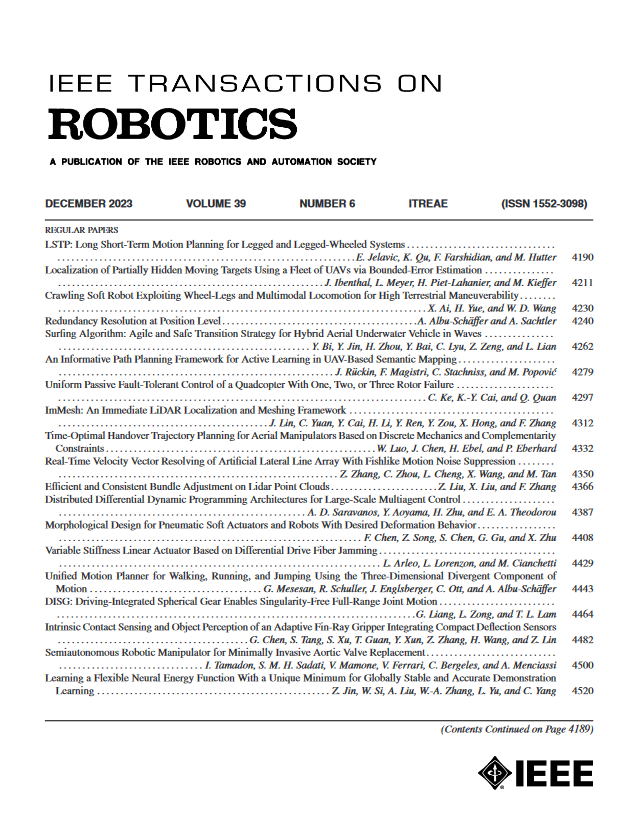Meta-Learning Enhanced Model Predictive Contouring Control for Agile and Precise Quadrotor Flight
IF 9.4
1区 计算机科学
Q1 ROBOTICS
引用次数: 0
Abstract
In agile quadrotor flight, accurately modeling the varying aerodynamic drag forces encountered at different speeds is critical. These drag forces significantly impact the performance and maneuverability of the quadrotor, especially during high-speed maneuvers. Traditional control models based on first principles struggle to capture these dynamics due to the complexity and variability of aerodynamic effects, which are challenging to model accurately. To address these challenges, this study proposes a meta-learning-based control strategy for accurately modeling quadrotor dynamics under varying speeds, treating each velocity condition as an independent learning task with a specifically trained neural network to ensure precise dynamic predictions. The meta-learning framework rapidly generates task-specific parameters adapted to speed variations by solving an optimization problem and employs an online incremental learning strategy to integrate real-time data for continuous model updates, enhancing system robustness. Regularization is introduced to prevent overfitting and improve generalizability. The integration of the meta-learned model into Model Predictive Contouring Control (MPCC) allows the system to achieve optimal control across different velocity levels, ensuring efficient and accurate flight control even during sharp turns and high-speed maneuvers. Extensive simulations and real-world experiments confirm that the proposed algorithm maintains a high level of control precision despite the nonlinear effects of rapid speed changes, complex flight trajectories and wind disturbances. The results highlight the advantages of combining meta-learning with adaptive control strategies, providing a robust framework for quadrotors operating in diverse and dynamic environments.基于元学习的敏捷精确四旋翼飞行模型预测轮廓控制
在敏捷四旋翼飞行中,准确建模不同速度下遇到的不同气动阻力是至关重要的。这些阻力显著影响四旋翼的性能和机动性,特别是在高速机动期间。由于空气动力学效应的复杂性和可变性,传统的基于第一性原理的控制模型难以捕捉这些动力学,这对准确建模具有挑战性。为了解决这些挑战,本研究提出了一种基于元学习的控制策略,用于在不同速度下精确建模四旋翼动力学,将每个速度条件视为独立的学习任务,并使用经过专门训练的神经网络来确保精确的动态预测。元学习框架通过解决优化问题快速生成适应速度变化的任务特定参数,并采用在线增量学习策略集成实时数据以进行持续模型更新,增强系统鲁棒性。引入正则化以防止过拟合和提高泛化能力。将元学习模型集成到模型预测轮廓控制(MPCC)中,使系统能够在不同速度水平下实现最佳控制,即使在急转弯和高速机动时也能确保高效准确的飞行控制。大量的仿真和现实世界的实验证实,尽管高速变化的非线性影响,复杂的飞行轨迹和风的干扰,所提出的算法保持了高水平的控制精度。研究结果强调了将元学习与自适应控制策略相结合的优势,为四旋翼飞行器在多样化和动态环境中运行提供了一个强大的框架。
本文章由计算机程序翻译,如有差异,请以英文原文为准。
求助全文
约1分钟内获得全文
求助全文
来源期刊

IEEE Transactions on Robotics
工程技术-机器人学
CiteScore
14.90
自引率
5.10%
发文量
259
审稿时长
6.0 months
期刊介绍:
The IEEE Transactions on Robotics (T-RO) is dedicated to publishing fundamental papers covering all facets of robotics, drawing on interdisciplinary approaches from computer science, control systems, electrical engineering, mathematics, mechanical engineering, and beyond. From industrial applications to service and personal assistants, surgical operations to space, underwater, and remote exploration, robots and intelligent machines play pivotal roles across various domains, including entertainment, safety, search and rescue, military applications, agriculture, and intelligent vehicles.
Special emphasis is placed on intelligent machines and systems designed for unstructured environments, where a significant portion of the environment remains unknown and beyond direct sensing or control.
 求助内容:
求助内容: 应助结果提醒方式:
应助结果提醒方式:


